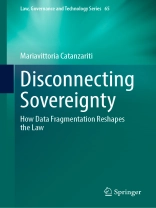This book explores the dynamic legal semantics of territory as applied to data. It offers a theoretical assessment of the legal challenges that data flows pose for the principle of territoriality and for state sovereignty more generally. The concept of sovereignty has traditionally developed in close connection with the exercise of powers over a territory, and ideas of jurisdiction have always been based on the principle of territoriality. Digitalization questions however the very idea of physical frontiers. Interconnected networks make data in effect borderless. Data can in fact be created, stored, processed, and accessed anytime and from anywhere.
The idea of the book is upbeat: the law can keep pace with the ability of data to fragment reality. The condition for this is that sovereignty disconnects from territory. Disconnection is not getting rid of the territory once and for all, it only means that for data alternatives to the territorial connection exist.
The analysis focuses on data from a holistic perspective (personal and nonpersonal) with the aim of investigating divergent and convergent solutions provided by different branches of the law (data protection, IP law, international law, and fundamental rights protection). It assesses in particular, the relationships between digitalization and the principle of territoriality, focusing on the specific legal aspects: the connections between law and territory; the impact of digitalization on state sovereignty; the use of extraterritoriality to circumvent territorial limitations on data flows; the rise of digital jurisdiction and its challenges; the interplay between digital jurisdiction and state sovereignty, and the alternative technological and legal solutions to data localization.
Tabela de Conteúdo
Introduction.- The Territory of Data or the Data of the Territorial State? The Shift of a Paradigm.- The Off-line Juridification of the On-line Space.- Codifying Digital Extraterritoriality.- Digital Jurisdiction and Data Sovereignty.- How Technology Replaces Territory.- Conclusions.
Sobre o autor
Mariavittoria Catanzariti (Ph D in Law, University of Roma Tre, 2011) has been working as a researcher in prestigious institutions, such as Berkeley Law School, Institute for Contemporary History and European University Institute. She is currently Assistant Professor in Legal Philosophy at the University of Padua and Research Fellow at the European University Institute. Her main research interest lies in law and information, from the broader perspective of legal theory and legal sociology. Her special focus is on European law. She is the author of a monograph on secrecy and several edited volumes, book chapters and articles published in Italian and International Journals.












